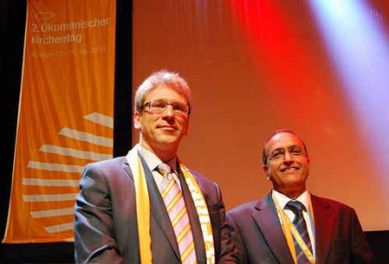Religious Should Co-Work to Help Poor: Faith Leaders

People of all faiths must witness together to God's compassion in a world where too many suffer destitution and injustice, Muslim and Christian scholars said yesterday.
Ultimately, it is "no advantage for Jews to be Jews, Christians to be Christians, and Muslims to be Muslims," what really matters is the "human concern" for "the poor and the needy," Muslim scholar Dr. Ataullah Siddiqui said following an interfaith Bible study at a German church convention.
Siddiqui conducted the Bible study together with the Rev. Olav Fykse Tveit, general secretary of the World Council of Churches (WCC), with the text taken from Matthew 25:31-46 - a passage often referred to as "the judgment of the nations."
According to Siddiqui, the text of Matthew 25 reveals that human dignity cannot be compromised, and there is a need for "co-witnessing" with Muslims, Christians and people of other faiths standing together.
For that to happen, Siddiqui said, people of faith need to have "respectful, hospitable theologies" and must be able to "recognize and appreciate the otherness of the other."
For Tveit, the text of Matthew 25 does not intend to speculate "about scenarios for the future", but rather expresses "critical, sometimes surprising perspectives on our life here and now."
It tells the reader that what is required here and now is "spontaneous attention to the basic need of another human being," he said.
"The criterion is to live as Jesus Christ did. Sometimes even against some religious rules – for the sake of humanity. Christ alone is a criterion for the real life of a human being created in God's image," Tveit said.
The Bible study was part of the program of the second annual Ecumenical Kirchentag, which was held May 12-16 in Munich. Organized by Protestant and Catholic lay movements, the event attracted some 125,000 participants and was centered on the theme "that you have hope" taken from 1 Peter 1:21.